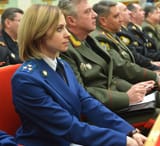Search Results
6/19/2025, 6:38:32 PM
>>63862683
>>63862861
To quote Friedrich Engels:
>The non-commissioned officers, as we have said, are mostly recruited from the soldiers' sons, educated in government establishments. From early boyhood subject to military discipline, these lads have nothing whatever in common with the men whom they are, subsequently, to instruct and direct. They form a class separate from the people. They belong to the state—they cannot exist without it: once thrown upon their own resources, they are fit for nothing. To get on, then, under the government, is their only object. What the lower class of employés, recruited from the sons of employés, are in the Russian civil service, these men are in the army: a set of cunning, low-minded, narrowly-egotistical subordinates, endowed with a smattering of elementary education, which almost renders them more despicable; ambitious from vanity and love of gain; sold, life and soul, to the state, and yet trying, daily and hourly, to sell the state, in detail, whenever they can make a profit by it. A fine specimen of this class is the feldjäger or courier who accompanied M. de Custine during his travels in Russia, and who is admirably portrayed in that gentleman's account of Russia. It is this class of men, both in the civil and military branches, which principally foments the immense corruption pervading all branches of the public service in that country. But as it is, there is no doubt that, if this system of total appropriation of the children, by the state, were done away with, Russia would not be able to find a sufficient number of civil subaltern employés and military non-commissioned officers.
>>63862861
To quote Friedrich Engels:
>The non-commissioned officers, as we have said, are mostly recruited from the soldiers' sons, educated in government establishments. From early boyhood subject to military discipline, these lads have nothing whatever in common with the men whom they are, subsequently, to instruct and direct. They form a class separate from the people. They belong to the state—they cannot exist without it: once thrown upon their own resources, they are fit for nothing. To get on, then, under the government, is their only object. What the lower class of employés, recruited from the sons of employés, are in the Russian civil service, these men are in the army: a set of cunning, low-minded, narrowly-egotistical subordinates, endowed with a smattering of elementary education, which almost renders them more despicable; ambitious from vanity and love of gain; sold, life and soul, to the state, and yet trying, daily and hourly, to sell the state, in detail, whenever they can make a profit by it. A fine specimen of this class is the feldjäger or courier who accompanied M. de Custine during his travels in Russia, and who is admirably portrayed in that gentleman's account of Russia. It is this class of men, both in the civil and military branches, which principally foments the immense corruption pervading all branches of the public service in that country. But as it is, there is no doubt that, if this system of total appropriation of the children, by the state, were done away with, Russia would not be able to find a sufficient number of civil subaltern employés and military non-commissioned officers.
Page 1
